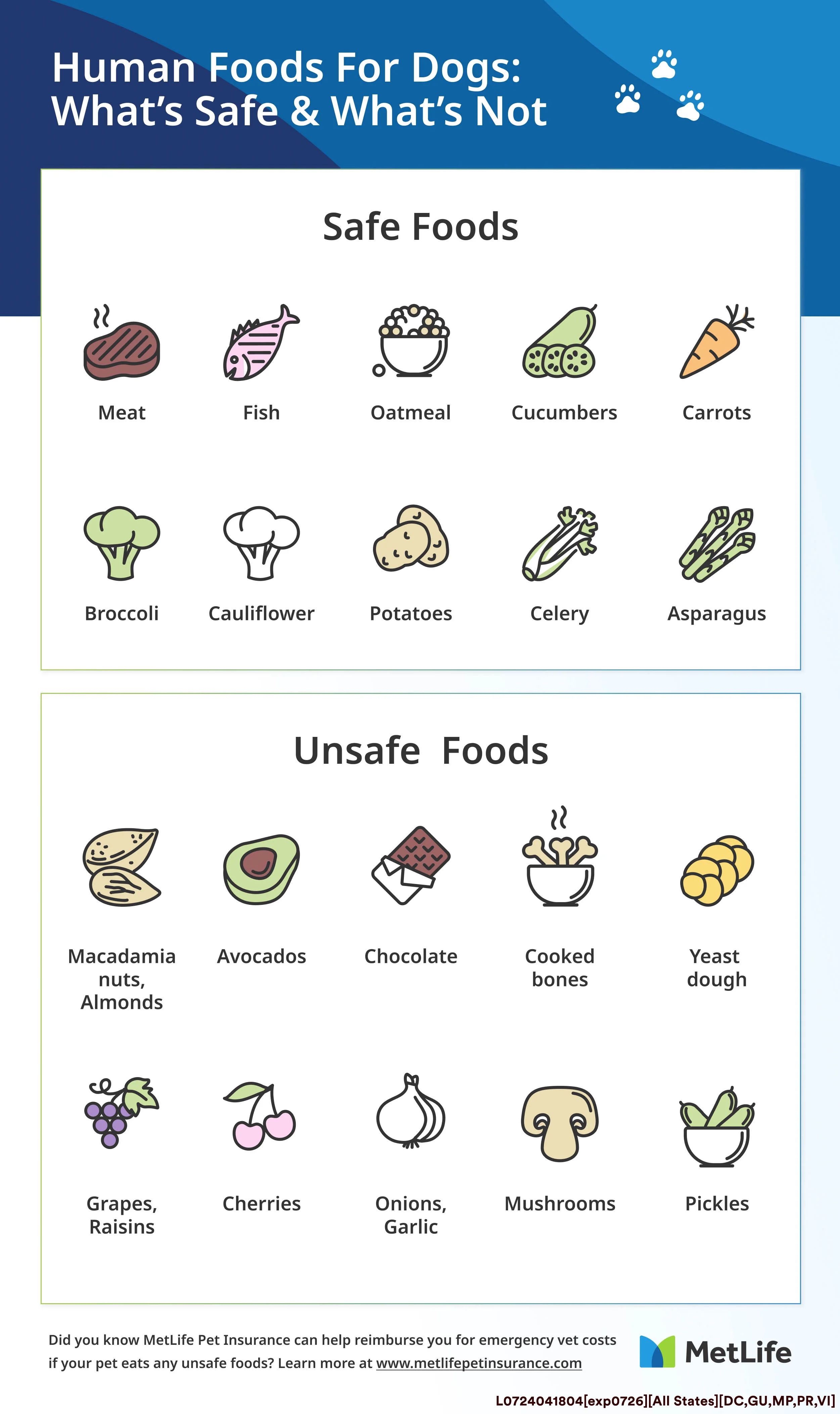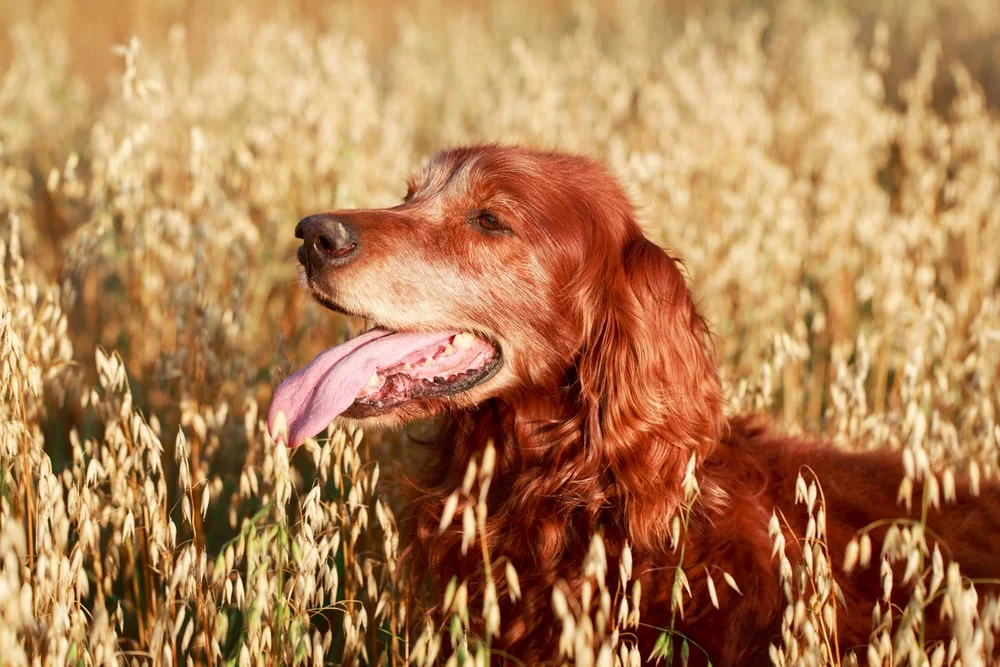PET HEALTH
What Human Food Can Dogs Eat? The Good, the Bad, & the Ugly
Dogs enjoy the same sweet, sour, salty, and bitter tastes we do. But what human food can dogs eat? And, just because they can eat something, does that mean they should?
Knowing what foods dogs can and can’t eat is vital to keeping your dog safe. Be mindful of any potential allergies your dog may have, and consult your veterinarian before changing your dog’s diet.
That said, let’s take a look at some of the most common questions about what dogs can have from your kitchen!
What Can Dogs Eat?
First, the good news. There’s a lot of food that dogs can safely eat, provided it’s given sparingly and without added seasoning or ingredients.
What kind of meat can dogs eat?
Most meats, poultry, and fish are safe for dogs to consume when fully cooked.1 It’s also important that any meat you give your dog is unseasoned. Lots of seasonings contain unsafe ingredients, like onion powder or garlic. Don’t worry, your dog will still enjoy the special treat!
Most meat, fish, and poultry are safe for dogs, including:1,2
MetLife Pet Can Help Cover Emergency Vet Bills
What kind of vegetables can dogs eat?
While not necessary for your dog’s diet, vegetables can be a fun treat. Vegetables for dogs are generally best served cooked.3 Consider steaming raw vegetables or creating a cooked puree. As with meat, avoid seasoning.
Several vegetables are safe for dogs to consume, including:3
What kind of fruit can dogs eat?
When given in moderation, dogs can benefit from eating fruit just as humans do. Many fruits are high in vitamins, minerals, and antioxidants, and their juice can help your dog stay hydrated.3 However, giving your dog too much fruit can lead to diabetes due to high amounts of sugar.5
Make sure your dog consumes only the flesh. Rinds, pits, seeds, and other plant material can be dangerous when ingested.3
Consider these fruits as a special sweet treat for your dog:3,5
- Apples
- Bananas
- Blackberries
- Blueberries
- Cantaloupe
- Mango
- Oranges (peeled)
- Peaches
- Pear
- Pineapple
- Pumpkin
- Raspberries
- Strawberries
- Tomatoes (in moderation and only the ripe flesh)
- Watermelon
What kind of nuts can dogs eat?
While some nuts are not toxic to dogs, nuts in general aren’t a great snack option for them. Nuts tend to be high in fat, which can lead to both obesity and pancreatitis. They could also pose a choking hazard if not chewed properly.6 Save nuts for only the rarest occasions, give them sparingly, and avoid ones that are salted or otherwise seasoned.
These nuts are considered non-toxic for your dog:6,7
- Cashews
- Peanuts
- Pistachios (unshelled)
Can dogs eat peanut butter?
Loved by many canine companions, peanut butter is generally safe for dogs. When giving peanut butter as a treat, consider unsalted and homemade peanut butters as the best options for your dog.8 If you’re opting for store-bought peanut butter, make sure it is free from xylitol, an artificial sweetener that’s dangerous for your pup to consume.
What kind of grains can dogs eat?
Yes, dogs can eat most grains when cooked. In fact, as omnivores, grains are an important part of your dog’s diet!9 Cooked grains, like rice, can occasionally be a helpful filler in your dog’s diet, especially during times of stomach upset.
Cooked grains that are non-toxic for your dog include:
- Bread (plain white or wheat, and in moderation)10
- Oatmeal (plain, cooked, and in moderation)11
- Popcorn (plain, air-popped, and in moderation)12
- Quinoa (plain and cooked)13
- Rice (plain, cooked white rice, served in moderation)9
What kind of cheese can dogs eat?
Dogs can safely eat cheese, but be mindful of how your pup responds to dairy. Some dogs have a lactose intolerance that can lead to stomach issues, including diarrhea. Others could be at risk of obesity or pancreatitis if fed too much.14
If you want to give them cheese, consider opting for: 14
- Cottage cheese
- Mozzarella
- Goat cheese
What Can't Dogs Eat?
There are lots of safe people food for dogs to eat, but it’s important to also be aware of the foods that are unsafe for them. Some foods are dangerous and can lead to serious health issues if consumed.
Dogs should avoid bones
It's best to avoid giving bones to your dog. Cooked bones are actually more dangerous for your dog. They can pierce and puncture their esophagus or intestines, which can lead to choking and intestinal blockages.15
If your dog feels the need to gnaw at bones, finding domestically sourced beef shank bones is your best bet.16 Just be sure the size of the bone matches the size of the dog!
Vegetables that are bad for dogs
Avoid giving your dog these veggies, or any foods that contain them as ingredients:
- Garlic
- Onions3
- Mushrooms17
Nuts that are bad for dogs
While no nuts are great for your dog, there are a couple that can actually harm them and should be avoided:
- Macadamia nuts6
- Almonds18
Fruits that are bad for dogs
Fruit can be a sweet treat, but not all of them are good for your pup. Fruits to avoid include:
- Grapes and raisins3
- Avocados3
- Cherries19
Other foods that are bad for dogs
Other foods that could lead to problems for your dog if ingested include:
MetLife Pet Can Help Cover Food-Related Emergencies
Is human food bad for dogs? Not always! Sometimes, it can be an exciting snack. Other times, human food might cause stomach trouble, especially if your pup has a food sensitivity. The best way to prepare for a food-related emergency with your dog is to know which foods are toxic, as well as any allergies your pet may have. Always consult your veterinarian before adding different foods and treats to your dog’s diet.
No matter how much pet owners prepare, accidents can always happen. When dogs eat something they shouldn’t, an emergency vet visit can quickly become expensive. Having a MetLife Pet Insurance policy can help cover those unexpected but life-saving costs.
Consider the case of Gabriel, a New Jersey dog who swallowed a corn cob! This caused a dangerous intestinal blockage, and fixing it would have cost Gabriel’s parents over $13,000. Fortunately, they had pet insurance from MetLife Pet and were reimbursed for nearly $11,800.23 Getting a dog insurance policy with MetLife Pet could help you keep your pup safe in a similar emergency. Learn more about how our pet insurance works, or fetch a free custom quote.





